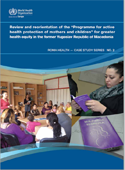Review and reorientation of the “programme for active health protection of mothers and children” for greater health equity in the former Yugoslav Republic of Macedonia

Download
Roma Health – Case Study Series No. 2
2013, xii + 44 pages
ISBN 978 92 890 5090 6
This publication presents the process of and lessons learned from the review and reorientation of a programme for active health protection of mothers and children for greater health equity, with an explicit but not exclusive focus on the Roma population, carried out in the former Yugoslav Republic of Macedonia. Using the methodological guide on integrating equity into health strategies, programmes and activities developed by the Ministry of Health, Social Services and Equality of Spain, the analysis of selected services within the programme shows that Roma and rural women benefit less than women from urban areas and with more education. Barriers and facilitating factors for using the services were related to their availability, accessibility and acceptability, contact with services and effectiveness of coverage.
The review showed that barriers and facilitating factors were strongly related to the social determinants of health, both intermediary and structural. The analysis of the programme's context shows that most of the existing policy documents support its implementation and a number of mechanisms for social participation of target populations. Several facilitating factors were created and incorporated into the new proposed programme to improve the response to the health needs of all women in general and particularly the most vulnerable, such as Roma. The study concluded that the reorientation process is a systematic evaluation process, useful as a continuous cycle of improvement that could enhance the equity, effectiveness and quality of health programmes.



